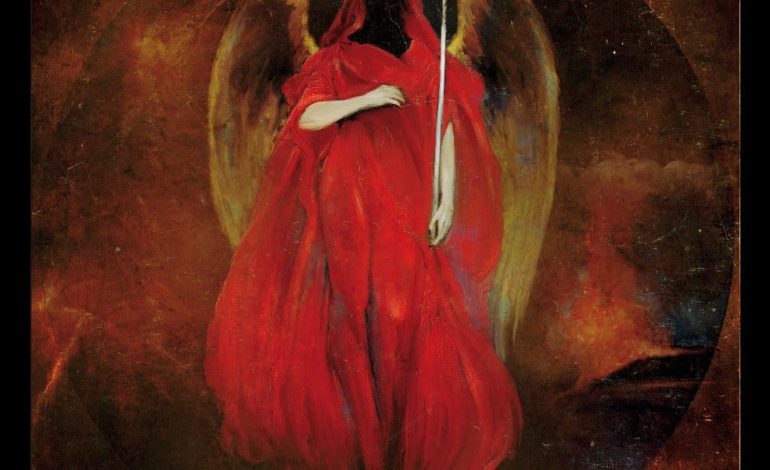

Triptykon pick up where Celtic Frost left off on their newly live-debuted masterwork Requiem
The long-awaited and highly anticipated Requiem has been shelved since the late ’80s, an unfinished concept by the legendary extreme-metal pioneers Celtic Frost, founded by the frontman, guitarist and vocalist of Triptykon, Tom “G. Warrior” Gabriel Fischer. Debuted live at the heavy music festival Roadburn in 2019, Requiem is accompanied by the marvelous Metropole Orkest and Safa Heraghi’s co-lead vocals.
Although originally planned for a release as early as 1998, the struggle of recording and producing Requiem was so harrowing that it directly lead to the break-up of Celtic Frost before the final third could be completed. And so, Triptykon’s inception to debut the masterpiece that is Requiem has finally reached full circle.
“Rex Irae – Chapter One: Overture,” originally from Celtic Frost’s Into The Pandemonium (1987), opens the musical journey that is Requiem perfectly. Immediately, the live mix and blend of the dual male and female lead vocals are immaculate as they support the crushing guitar tones that V. Santura and Tom G. Warrior provide. The Metropole Orkest’s deep, dark string arrangements compliment the moody nature of the music as a bassy drone segues into the proceeding movement.
“Grave Eternal – Chapter Two: Pt. 1” is the official opening of the piece that is Requiem, as it is bookended with two previously released movements. The introductory slow, sludgy drum beat and guitar riff is followed by a very touching and moving timbral layer of brass, strings and percussion, leading into two solo sections of emotional guitar work and soaring vocals, which seamlessly lead into the second part.
“Grave Eternal – Chapter Two: Pt. 2” has a rhythmic pulse right from the beginning ashes of the previous track. The movement slowly builds up around some eerie cellos and church bells before being greeted by an uplifting delayed guitar riff and haunting orchestral wave of sound. This is eventually closed by a faint vocal and string melody that transitions into the following movement.
Hannes Grossman and company provide some percussion for the opening of “Grave Eternal – Chapter Two: Pt. 3,” a fairly short instrumental track that mainly focuses on Grossman’s drumming and Vanja Slajk’s in-your-face distorted bass. “Grave Eternal – Chapter Two: Pt. 4” follows suit as the shortest track at just over two minutes, being a transitional, ambient orchestral piece that introduces the closing third of the suite that is Requiem.
“Grave Eternal – Chapter Two: Pt. 5” opens up with an earth-shattering drum and bass groove that flows and breathes throughout the entire movement. Although the piece does not build up or down in dynamics, it is speckled with clean, reverberated guitar and a dark, live drum sound that is comparable to Triptykon and Celtic Frost’s earlier work, highly influenced by 1980’s goth-rock and post-punk alike.
The closing movement to the “Grave Eternal – Chapter Two” suite, “Pt. 6”, opens with a thunderous chord progression that supports the highly emotional guitar solo near the beginning. As the track progresses, the dark brass dies down with the operatic female vocals before a brief, quiet cacophony of the ending horns drone, featuring the first recording of live applause on the movement as the “Grave Eternal – Chapter Two” section of Requiem is concluded.
The conclusion to the entirety of Requiem is found in “Winter – Chapter Three: Finale,” originally from their 2006 culmination, Monotheist, which perfectly ends the epic, six-part suite that is found before it. Although not particularly interesting or unique, the sorrowful and haunting chords found on the finale help bookend the entire piece quite well.
As far as live albums go, Requiem’s pristine and crystal clear production alone is noteworthy. However, the compelling and interesting backstory that shapes it is the real hero here. With 30 years under its belt, Requiem has had plenty of time to be regarded as the epic it is through masterful songwriting, a great live performance and unique backstory. The only possible qualms to really be had about Requiem, noting that again, this is a live debut, is the rushed songwriting apparent towards the end, which features four back-to-back mostly instrumental pieces that are more minimalist in composition as opposed to the post-rock influenced tracks found before them. Overall, Triptykon’s Requiem is epic in nature and holds up to all expectations, especially being 30-plus years in the making.
